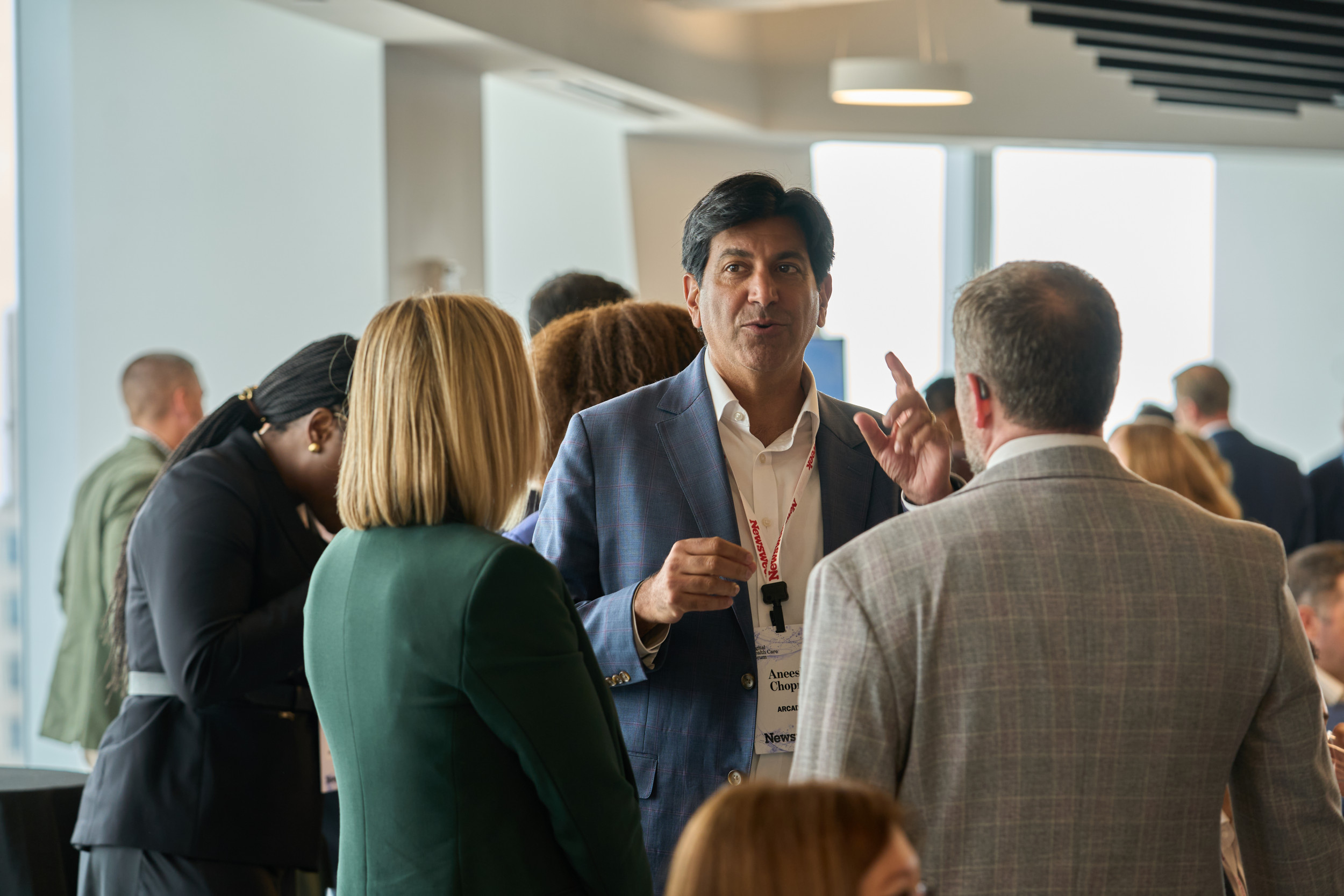
Health care leaders from around the globe took the stage at Newsweek’s Digital Health Care Forum on Tuesday.
Some traveled to magazine headquarters at the One World Trade Center from other parts of the most populous city in the United States, others from the nation’s rural areas. There were even attendees from Mexico, Spain, Belgium and Colombia–all gathered to figure out the path forward for health technology.
Across nine panel discussions and two fireside chats, hundreds of guests listened to high-profile speakers including Aneesh Chopra, the first U.S. chief technology officer under the Obama administration; Jason Lineen, the chief strategy officer of UVA Health; Dr. Daniel Yang, the vice president of AI and emerging technologies at Kaiser Permanente; Drew Goldstein, the co-head of healthcare at Palantir; and Dr. Baligh Yehia, the president of Jefferson Health.
“I was excited to see the topics that were being covered,” Courtney Helt, an account executive at health care operations platform Symplr, told Newsweek on Tuesday. “This is our first time here. I came with our chief information officer… We wanted to see what it was about and you had a great agenda.”
The all-day event, hosted at magazine headquarters, kicked off with a breakfast spread of buttery pastries and cold brew coffee, much to the relief of guests who found themselves in New York City on a particularly warm September morning.
Programming began sharply at 10 a.m. ET with opening remarks from Alexis Kayser, Newsweek’s health care editor, and Tina Freese Decker, board chair of the American Hospital Association and the president and CEO of Corewell Health.
“It was the best of times, it was the worst of times,” Kayser quoted Charles Dickens, as she reflected on the state of the health care industry.
Speaking to a packed room, she touched on the biggest challenges and opportunities that the industry is facing today, from aging populations to advancements in artificial intelligence, from rising costs to new predictive tools and from regulations to recent funding cuts in the U.S.
In the morning, health care experts addressed the elephant in the room: risk.
During the first panel of the day, Danny Sama, Northwestern Medicine’s chief digital executive and vice president of information services, talked about the ethical tightrope that health systems must walk when considering how to use patient data. David Callender, the president and CEO of Memorial Hermann Health System, and James Hereford, the president and CEO of Fairview Health Services, also made cases for “healthy risks” and a necessary shift in mindset while offering advice for building a tech portfolio with an impressive return on investment.
Umar Nadeem, the co-founder of Kabilah, told Newsweek that he was particularly impressed by what Dennis Murphy, the president and CEO of IU Health, had to say on the “Breaking Down Silos: Achieving True IT Integration in Health Care” panel. Nadeem said he found Indiana’s integrated health network “super interesting” and that it posed a new question for him about what competition will look like in the future. Kabilah is a generative AI built to improve nursing workflows.
“[Newsweek’s Digital Health Care Forum] is a more intimate setting, compared to some other health care events,” Nadeem said. “As we go into the conference circuit, this is not only a great appetizer for what’s coming, but also a very focused event that’s answering real questions that higher level executives are facing.”
Attendees also had the chance to preview Memorial Sloan Kettering Cancer Center’s new pavilion during the morning’s programming. Flanked by colorful and dynamic video renderings of the Kenneth C. Griffin Pavilion, Kreg Koford, Memorial Sloan Kettering’s senior vice president of real estate and operations, detailed plans for the state-of-the-art cancer center, which will feature 12 new operating rooms and 2,018 inpatient beds. The facility is set to open on the Upper East Side of Manhattan in 2030.
Before breaking for lunch, Aman Kidwai, Newsweek’s workplaces editor, moderated the “CMIOs and CNIOs: The Missing Link in Change Management” panel.
The panelists all demonstrated their essential communication skills as they drew laughs from the audience and showed why it was important for chief medical and nursing informatics officers to be able to “translate” for IT and clinicians.
Many chuckled as Dr. Lavonia Thomas, MD Anderson’s chief nursing informatics officer, told the crowd plainly that the biggest obstacle to tech adoption is oftentimes “a nurse who will not do it.” The laughter returned as Dr. Shawn Griffith, the president and CEO of URAC, made a nod to his Iowan roots while arguing that silos in health care are really “kingdoms with moats.”
For lunch, attendees feasted on a wide selection of cuisines. While standing in line for the taco bar, Dr. Sheila Owens-Collins, the president and CEO of NPM Health and Consulting, told Newsweek she found herself at the health care forum after attending the AI Impact Summit back in June.
Owens-Collins, who lives in Maryland but is working in Guam as a contractor this year, attended Tuesday’s event with Dr. Sandra Ilaka-Chibuluzo, a pediatric endocrinologist at Northern Light Health.
Both doctors praised the CMIOs and CNIOs panel, with Owens-Collins expressing interest in how different organizations are introducing technology, and Ilaka-Chibuluzo finding it helpful given her interest in exploring that profession down the road.
Ilaka-Chibuluzo also enjoyed the presentation on smart hospitals from Duncan Ross, Newsweek’s global head of research, and Dr. Lukas Kwietniewski, Statista’s director of health care analysis.
“Everything has been wonderful,” Ilaka-Chibuluzo told Newsweek.
“I wasn’t aware of the smart hospital surveys and rankings [before today]. I think it’s incredible and I’m going to be looking further into that to see where people are internationally, where we are in the U.S. and where technology is moving,” she said. “I work in a rural area, so my interest is in access… There’s a lot of exciting changes that are coming up.”
After lunch, speakers took the stage to talk about the next era of virtual and home-based care and to learn from some of the best use cases of AI implementation in health care.
Dr. Nabil Chehade, the chief clinical transformation, innovation and strategy officer at The MetroHealth System, emphasized how critical it is for existing health systems to bridge the gaps in virtual care, while Joe Petro, the corporate vice president of Microsoft Health and Life Sciences, offered advice for how to differentiate legitimate tech advancements from “the next shiny ball to chase” during the “AI: Fact, Fiction and Future” discussion.
Chopra, Yang and Yehia took the stage together for the “Pacing Innovation: Balancing Governance, Risk and Progress” panel, where each of them explained their reasons for being bullish or conservative when it comes to tech adoption.
Chopra, who argued for a third category in the field of new product development, also revealed his thoughts on President Donald Trump’s latest rural health transformation program during the discussion, praising it as a “mosaic of great ideas.”
Meanwhile, Yehia, who said Jefferson was bullish on AI, shared a major announcement with the audience, telling them that Jefferson Health is committed to returning 10 million hours back to patients by 2028.
Helt told Newsweek she came to the event hoping to learn more about what health systems are doing on the AI front and how they view the market.
“There’s a wide variety that we heard about today, so it was really nice to hear,” Helt said.
At the end of the day, attendees were invited to a cocktail reception where they networked over French onion soup dumplings and potatoes dressed in 24-karat gold and caviar.



